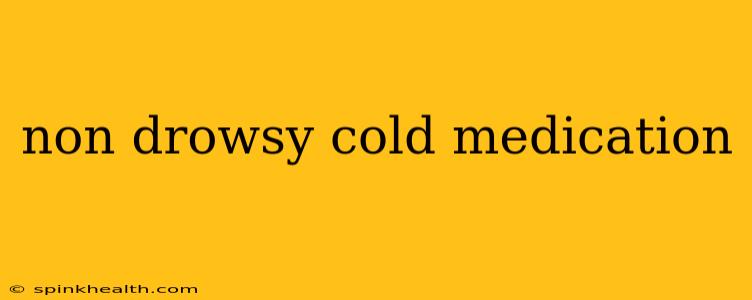Ah, the dreaded cold. That scratchy throat, the sniffles, the aches – it's enough to send anyone scrambling for relief. But many over-the-counter cold medications leave you feeling groggy and sluggish. The good news? Plenty of effective non-drowsy options exist, allowing you to fight off your cold symptoms without sacrificing your energy levels. Let's explore the landscape of non-drowsy cold remedies and find the perfect fit for you.
My journey to understanding non-drowsy cold medications began with my own battle with a particularly nasty head cold. I needed something to alleviate my symptoms, but the thought of spending the entire day in a haze was less than appealing. My search led me down a rabbit hole of decongestants, pain relievers, and cough suppressants – a world of active ingredients and formulations. This article distills what I learned, so you don't have to navigate the same confusing landscape.
What are the active ingredients in non-drowsy cold medications?
Many non-drowsy cold medications rely on specific active ingredients that target different symptoms without causing drowsiness. These typically include:
- Phenylephrine: This decongestant helps to shrink swollen blood vessels in the nasal passages, relieving stuffiness.
- Pseudoephedrine: Another decongestant, often more powerful than phenylephrine, but sometimes requires a pharmacist's signature due to its potential for misuse.
- Acetaminophen (Tylenol): A pain reliever and fever reducer, acetaminophen effectively tackles aches, pains, and fever associated with a cold.
- Ibuprofen (Advil, Motrin): Another pain reliever and fever reducer, ibuprofen works similarly to acetaminophen but may be a better choice for some individuals.
- Dextromethorphan (DXM): A cough suppressant that helps to reduce the urge to cough. It's important to note that some formulations do contain ingredients that can cause drowsiness, so check the label carefully.
What are the different types of non-drowsy cold medications?
Non-drowsy cold medications come in various forms to suit individual preferences and needs:
- Tablets or Capsules: Easy to swallow and convenient for on-the-go relief.
- Liquids: Often preferred for children or individuals who have difficulty swallowing pills.
- Nasal Sprays: Provide direct decongestion to the nasal passages.
How do I choose the right non-drowsy cold medication for me?
Choosing the right medication depends on your specific symptoms and any pre-existing health conditions. Always read the label carefully and follow the directions. If you have any concerns, consult with a pharmacist or doctor.
What are some common side effects of non-drowsy cold medications?
While designed to be non-drowsy, some side effects may still occur. These can include:
- Nausea: This is relatively uncommon but can occur, especially with higher doses.
- Upset Stomach: Similar to nausea, this can be mitigated by taking the medication with food.
- Headache: In some cases, medication can actually trigger headaches.
- High Blood Pressure: Certain decongestants can elevate blood pressure, so individuals with hypertension should consult their doctor before use.
Can I take non-drowsy cold medicine with other medications?
It's crucial to check for potential drug interactions before combining non-drowsy cold medications with other prescription or over-the-counter drugs. Some interactions can be serious, so it's always best to err on the side of caution and consult a pharmacist or doctor if you're unsure.
Are there any natural remedies for cold symptoms?
While non-drowsy medications offer effective relief, natural remedies can also help alleviate cold symptoms. These include:
- Rest: Adequate rest is crucial for your body's recovery.
- Hydration: Drinking plenty of fluids helps to thin mucus and prevent dehydration.
- Warm liquids: Warm broths, tea, or honey lemon water can soothe a sore throat.
- Humidifier: Adding moisture to the air can help alleviate nasal congestion.
How long does it take for non-drowsy cold medication to work?
The onset of effects varies depending on the specific medication and formulation. Some provide relief within 30 minutes, while others may take longer. Always follow the directions on the label for optimal results.
Remember, this information is for general knowledge and should not be considered medical advice. Always consult a healthcare professional before starting any new medication, especially if you have pre-existing health conditions or are taking other medications. Finding the right non-drowsy cold medication can make a world of difference in managing your cold symptoms and keeping you active throughout your day.

